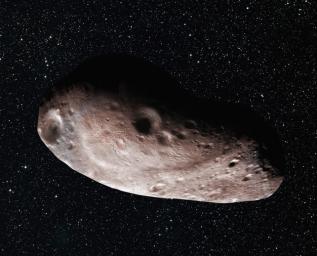
|
Artist’s Concept of 2014 MU69 as a Single Object
- Click the image above for a larger view
- Full-Res JPEG (2016 x 1628) (767.2 kB)
- Full-Res TIFF (2016 x 1628) (7.1 MB)
Caption:
Artist's concept of Kuiper Belt object 2014 MU69, which is the next flyby target for NASA's New Horizons mission. Scientists speculate that the Kuiper Belt object could be a single body (above) with a large chunk taken out of it, or two bodies that are close together or even touching (see PIA21867 ).
Background Info:
The Johns Hopkins University Applied Physics Laboratory in Laurel, Maryland, designed, built, and operates the New Horizons spacecraft, and manages the mission for NASA's Science Mission Directorate. The Southwest Research Institute, based in San Antonio, leads the science team, payload operations and encounter science planning. New Horizons is part of the New Frontiers Program managed by NASA's Marshall Space Flight Center in Huntsville, Alabama.
Cataloging Keywords:
| Name | Value | Additional Values |
|---|---|---|
| Target | 486958 Arrokoth | |
| System | Kuiper Belt | |
| Target Type | KBO | |
| Mission | New Horizons | |
| Instrument Host | New Horizons | |
| Host Type | Flyby Spacecraft | |
| Instrument | ||
| Detector | ||
| Extra Keywords | Artwork, Color | |
| Acquisition Date | ||
| Release Date | 2017-08-04 | |
| Date in Caption | ||
| Image Credit | NASA/Johns Hopkins University Applied Physics Laboratory/Southwest Research Institute/Alex Parker | |
| Source | photojournal.jpl.nasa.gov/catalog/PIA21868 | |
| Identifier | PIA21868 | |
